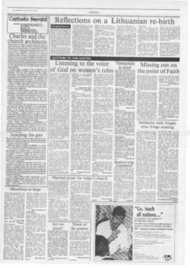Page 3, 4th November 1988
Page 3

Report an error
Noticed an error on this page?If you've noticed an error in this article please click here to report it.
Tags
Share
Related articles
Confronting The Nightmare Of Commercial Surrogacy
Postmortem Pregnancy Splits Pro-lifers
Government To Outlaw Surrogacy
Legacy Of Warnock
Is There Any Question Too Shameful For The Hfea?
Test tube turmoil hits at family life
LAST week's report on the latest surrogacy saga in Italy raises again the question of the Church's response to the problems posed by infertility. A 39 year-old Roman mother of three wanted a fourth child, by her second husband. But she was warned that another pregnancy might be dangerous. Her 20 year-old daughter by her first husband has agreed to act as the surrogate mother, offering her womb to bring to term the baby who is genetically linked to her mother and step-father. The Church has spoken out against what priests have described as a "serious eclipse" of moral values.
This is but a new variation on a very old theme. Contrary to popular opinion, the first surrogate baby was not Baby M in the USA nor Baby Cotton here but Baby Ishmael in the Book of Genesis. Abraham and Sarah, believing mistakenly that Sarah was infertile, used their slave-girl Hagar as a surrogate mother. The three parents endured all the contemporary problems of jealousy between surrogate and commissioning mother, and of conflicting feelings as to who should keep the child. Most importantly, of course, we should be concerned about the child and feel sorry for Ishmael. Yet for all those problems, at least Ishmael was alive. And this is where outsiders find the Church's attitude to surrogacy strange.
The child may suffer torn loyalties or a sense of displacement. But without surrogacy that child would never have existed. Should not a prolife Church rejoice at the possibilities of new life? Should not a pro-parenthood Church praise surrogates for what is often, as in the Italian case, a selfless gift to someone who wants to be a mother to another child but cannot physically achieve that noble aim without help?
No. The Church has its own reasons for opposing surrogacy. This is highlighted by the Bishops' Joint Committee on Bio-Ethical Issues' Response to the Warnock Report. Although the Committee endorsed the Report's conclusions on surrogacy (not all of which, incidentally, have been accepted by the government), it felt that the Warnock Committee had focussed on the wrong arguments: "Surrogacy does indeed violate human dignity. But it does so, fundamentally, for a reason which the Inquiry does not recognise: the proper context of human procreation is that exclusive sexual union which is called marriage, in which human affection, and exclusive and open-ended commitment, and the transmission of the bodily life of the partners, form the context in which the child is helped to find and form his own identity. Deliberate rupturing of that context does indeed treat human bodily life and capacities immorally."
That is an exacting doctrine, too exacting perhaps to form the policy for the law in a pluralist society where others feel that the gift of life is such a wonderful way of affirming a childless marriage that the law should not penalise those who engage in surrogacy for love rather than money. That feeling does indeed look like forming the basis for the law in the United Kingdom. The Surrogacy Arrangements Act 1985 has so far been the only legislative response to the Warnock Report. That statute has outlawed commercial agencies, one of the few recommendations within the Report for which there seemed to be widespread public support. But the White Paper, issued in preparation for the legislation due to be introduced in the next Parliamentary session, suggests that the Government is not keen to extend the prohibitions on surrogacy to non-commercial arrangements, adopting in effect the Warnock dissenting view.
This does not seem to me to be an unreasonable way forward for the law. But what is the most reasonable way forward for the Church in its response to issues like the Italian surrogacy case? There are, I think, two ways in which the Church can give a lead in dragging media attention away from the sensationalism of its surrogacy coverage and direct society's concern to more pressing matters.
First, the Bishops' Response to the Warnock Report made the best point in the whole debate when it noted the "Report's striking silence about the causes of infertility, and its consequent failure to consider how social policy might seek to reduce infertility by attending to its causes."
The Church should build on this foundation by calling for more research into the causes of infertjlity and how to prevent them. Not all infertility is avoidable, of course, but there should be more effort made in this direction.
Second, the Church should continue to locate the debate about surrogacy within the wider debate about the family, the duties of parents and the rights of children. Those who are fertile also have dilemmas about parenthood. Should they, for example, leave their children with nannies or child-minders? This is a topic which is preoccupying the popular press at present with respect to royalty. But it is a matter of concern also to those parents who feel they cannot afford not to continue working after their children are born. Are surrogates just ante-natal nannies? Are children caused more problems by having several surrogate parents after birth rather than before birth?
These are not easy issues to resolve, but they have more relevance to most lives than does the isolated case of surrogacy.
The Church is well placed to lead the debate about family life in the right direction and to add its own distinctive contribution. This
blog comments powered by Disqus













